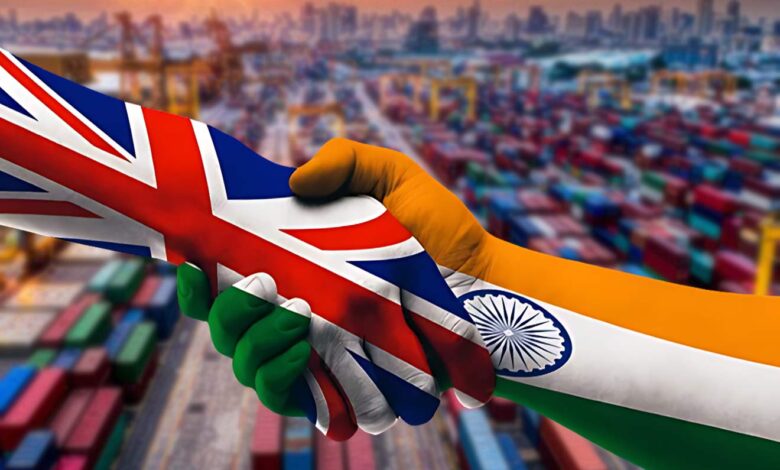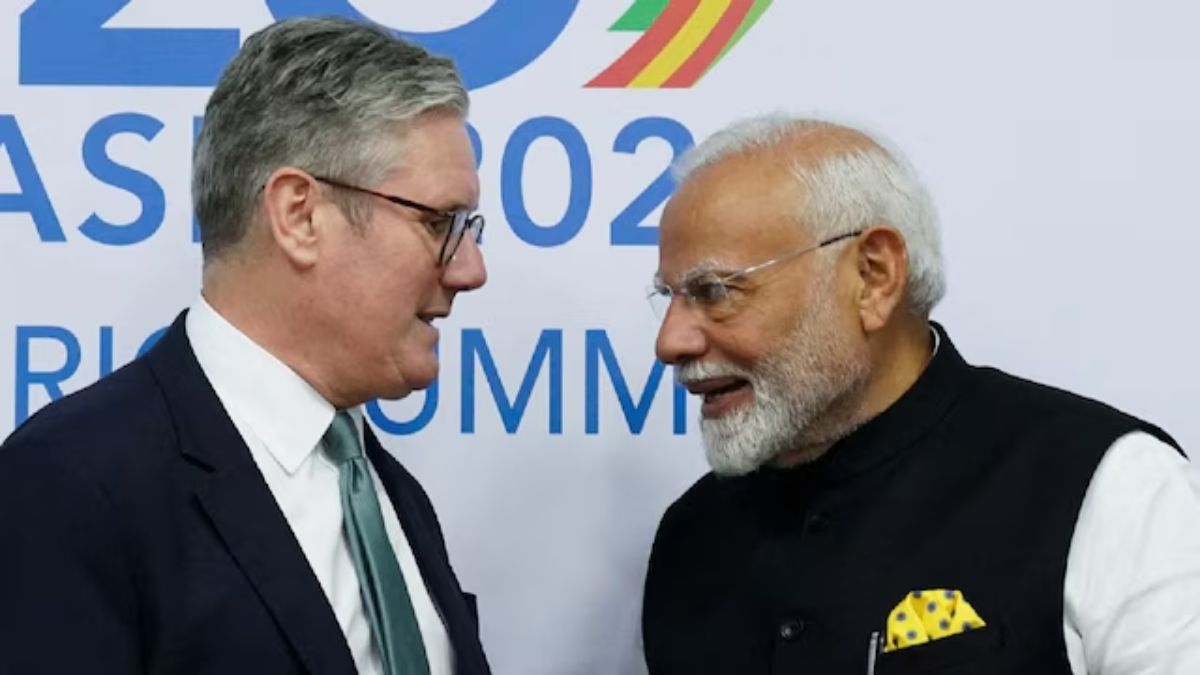The India-UK Free Trade Agreement (FTA) is a landmark deal between India and the United Kingdom. It aims to significantly boost trade and investment between the two countries. This agreement was framed to reduce or remove barriers like customs duties on a wide range of goods and services. Both nations, represented by their respective governments and trade ministries, worked to finalise the pact. Key leaders like Prime Minister Narendra Modi and UK Prime Minister Keir Starmer have been instrumental in these negotiations.
The FTA seeks to create new opportunities for businesses, encourage investment, and ultimately lead to economic growth and job creation in both India and the UK.
ALSO READ | What is Free Trade Agreement? List of Countries with which India has Signed FTAs
What is the India-UK Landmark Free Trade Agreement?

The India-UK Landmark Free Trade Agreement (FTA) is a major deal aimed at making trade easier and more beneficial between India and the United Kingdom. It's a big step forward in their economic relationship.
What is it?
The India-UK FTA is a legally binding agreement that aims to:
- Reduce or eliminate tariffs: This means lowering or completely removing taxes (customs duties) on goods traded between the two countries. This makes products cheaper for consumers and more competitive for businesses.
- Ease trade barriers: Beyond tariffs, it tackles other obstacles that make it hard to trade, such as complex rules, paperwork, and differing standards.
- Increase market access: It opens up new opportunities for businesses in both countries to sell their goods and services in each other's markets.
- Boost investment: The agreement also aims to encourage more money to be invested by businesses from one country into the other.
Why was it signed?
The FTA was signed to achieve several important goals:
- Economic Growth: Both India and the UK want to boost their economies, create jobs, and increase prosperity. By making trade easier, they hope to achieve this.
- Post-Brexit Opportunities for the UK: For the UK, after leaving the European Union, signing FTAs with major global economies like India is crucial to finding new trade partners and opportunities.
- Diversification for India: India seeks to strengthen its trade relationships beyond traditional partners and access new markets for its growing industries.
- Strategic Partnership: Beyond just trade, the FTA strengthens the overall strategic partnership between India and the UK, covering areas like defence, technology, and people-to-people ties.
Who Signed it?
The agreement was formally signed by:
- India's Prime Minister Narendra Modi
- UK's Prime Minister, Keir Starmer
They were present during the signing, while the actual signing was done by India's Commerce and Industry Minister Piyush Goyal and UK Trade Secretary Jonathan Reynolds.
When was it Signed?
The India-UK Free Trade Agreement was officially signed on Thursday, July 24, 2025, during Prime Minister Narendra Modi's visit to the UK.
Key Highlights and Benefits:
For India:
- Duty-free access to the UK market for 99% of Indian products: This is a huge win for Indian exports, especially in labour-intensive sectors like textiles, footwear, gems and jewellery, and engineering goods, which previously faced duties of 4% to 16%.
- Easier entry for Indian professionals: The agreement provides assured temporary access to the UK market for Indian professionals like chefs, yoga instructors, and IT specialists.
- Exemption from social security contributions: Indian workers temporarily posted in the UK can be exempt from paying social security for up to three years, saving them and their employers significant money.
- Boost for Agriculture and Fisheries: Indian farmers and the fisheries sector will benefit from duty-free access for many agricultural and marine products, allowing them to compete better in the UK market.
For the UK:
- Reduced tariffs on nearly 90% of UK goods entering India: This will make British products more affordable in India.
- Big cuts on duties for British whisky and gin: Tariffs will drop significantly, making these popular products much cheaper in India over time.
- Lower tariffs on certain UK-made automobiles: Car duties will be reduced, improving the competitiveness of British car manufacturers in India.
- Access to Indian federal government procurement tenders: UK firms can bid for government contracts in India worth over a certain amount, opening up a large market.
- Benefits for financial and professional services: The agreement includes commitments that benefit UK companies in IT, financial services, and professional services like consulting and engineering.
Overall Impact:
- The deal is expected to significantly increase bilateral trade between India and the UK, with projections aiming to double it to around $120 billion by 2030.
- It's seen as a major economic win for both countries, creating jobs, boosting wages, and driving growth.
- The FTA is also accompanied by a UK-India Vision 2035 roadmap, aiming to deepen ties in areas like defence, climate solutions, and education.
Key Highlights of FTA
)
Source: Firstpost
The India-UK Free Trade Agreement (FTA) is designed to bring significant economic benefits to both countries. Here are the key highlights:
For India:
- Duty-Free Access for Indian Goods: A major win for India is that nearly 99% of its products will gain duty-free access to the UK market. This is especially beneficial for labour-intensive sectors like:
- Textiles and clothing
- Footwear
- Gems and jewelry
- Furniture
- Auto components and engineering goods
- Many of these products currently face UK duties of 4% to 16%, so this reduction will make them much more competitive.
- Benefits for Agriculture and Fisheries: Indian farmers and the fisheries sector will see duty-free access for many agricultural and marine products, including spices, processed foods, mango pulp, and seafood like shrimp and tuna. This allows them to compete better in the UK market.
- Easier Entry for Indian Professionals: The agreement provides assured temporary access to the UK market for various Indian professionals, such as:
- Chefs
- Yoga instructors
- Musicians
- IT specialists
- Business visitors and intra-corporate transferees will also benefit from relaxed rules.
- Social Security Exemption: Indian workers temporarily posted in the UK can be exempt from paying social security contributions for up to three years, leading to significant savings for them and their employers.
- Boost for Manufacturing: Sectors like electronics, pharmaceuticals, chemicals, food processing, and plastics are expected to see a boost in exports.
For the United Kingdom:
- Reduced Tariffs on UK Goods: India will reduce tariffs on nearly 90% of UK goods entering its market. This makes British products more affordable for Indian consumers and businesses.
- Big Cuts on Whisky and Gin Duties: Tariffs on popular British products like whisky and gin will drop significantly, from 150% to 75% immediately and then gradually to 40% within ten years. This gives UK distillers a significant advantage in the large Indian market.
- Lower Tariffs on Automobiles: Duties on certain UK-made automobiles will be reduced from over 100% to 10% under a quota system, improving their competitiveness in India.
- Access to Government Procurement: UK firms will be allowed to bid on Indian federal government procurement tenders above a certain value in non-sensitive sectors, opening up a large market.
- Benefits for Services Sector: The agreement includes commitments that benefit UK companies in financial services, professional services (like consulting and engineering), and IT, ensuring they are treated on an equal footing with domestic suppliers.
- New Investment and Export Wins: The deal is expected to bring in significant new investment and export opportunities for the UK, creating thousands of jobs.
Overall, the UK government expects the deal to add substantial value to its GDP annually and lead to an uplift in wages for British workers. Consumers in both countries are also expected to benefit from cheaper imported goods.
List Of Countries With Which India Has Signed FTAs In Last Five Years
India's strategic approach to international trade has seen a significant boost in recent years, marked by the conclusion of several key Free Trade Agreements (FTAs). These modern agreements are a cornerstone of India's foreign economic policy, designed to secure stable market access, enhance competitiveness, and integrate the nation more deeply into global value chains.
Here's the list of the major Free Trade Agreements (FTAs) and similar comprehensive pacts signed by India in the last five years, covering the period from late 2020 to late 2025:
| Country/Bloc | Agreement Name | Date Signed | Type of Agreement |
| Mauritius | Comprehensive Economic Cooperation and Partnership Agreement (CECPA) | February 2021 | Comprehensive Economic Pact |
| United Arab Emirates (UAE) | Comprehensive Economic Partnership Agreement (CEPA) | February 2022 | Comprehensive Economic Pact |
| Australia | Economic Cooperation and Trade Agreement (ECTA) | April 2022 | Economic and Trade Pact |
| European Free Trade Association (EFTA) | Trade and Economic Partnership Agreement (TEPA) | March 2024 | Comprehensive Economic Pact |
| United Kingdom (UK) | Comprehensive Economic and Trade Agreement (CETA) | July 2025 | Comprehensive Economic Pact |
Transpiring these accords is a testament to India's revived enthusiasm for multilateral and bilateral trade diplomacy, after a phase of reassessment. The mere lowering of tariffs is not the only thing these agreements do; they also indicate a paradigm shift in India's trading relations with the rest of the world, leading to profound economic integration through the addition of chapters on investment, intellectual property, and trade in services.
The EFTA—Europe Free Trade Association member States comprising Switzerland, Norway, Iceland, and Liechtenstein—agreement is unique because it includes a legally binding promise from the EFTA bloc to invest $100 billion in India over the next 15 years.
These types of ground-breaking provisions reflect a forward-looking trade policy that involves removing barriers to market access and setting specific investment and employment targets. This, in turn, enables India to become a global manufacturing and services hub while ensuring its economic interests prevail.
Comments
All Comments (0)
Join the conversation